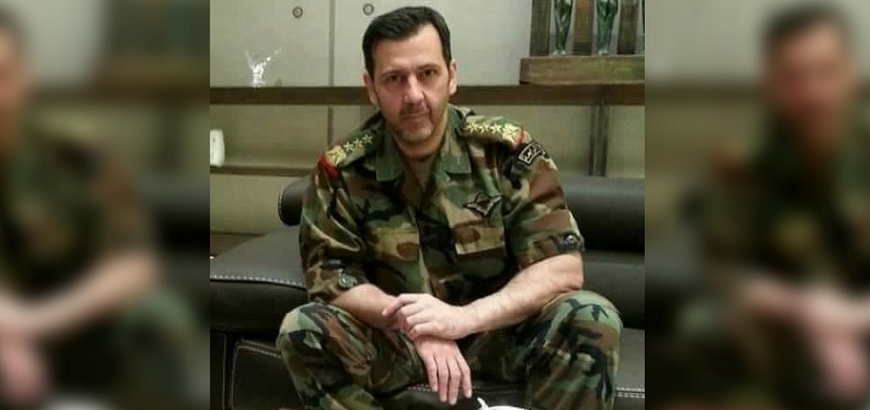Maher al-Assad is finding himself in direct confrontation with Russian efforts that aim to clip his wings militarily. So far, it seems that they have succeeded in curbing his influence, which had been continuously growing before. What is happening to Maher cannot be separated from Russian-Iranian competition, which reflects the Assad regime’s fragility.
Russia is trying to diminish Maher’s influence, which is tied to his close relations with Iran. The report also presents an aspect of the conflicts occurring inside the Assad family, the roots of which extend back four decades, and which could push Maher to pursue similar behaviors with his brother, as those that were taken by Rifaat al-Assad with Hafez.
Russian forces began their moves against Maher’s influence in a significant way in the last quarter of 2018, carrying out a widescale operation to purge regime military institutions of members loyal to Iran led by Maher al-Assad.
Since the removal of former Defense Minister General Fahd Jassem al-Freij and his replacement with General Ali Ayyoub, Russian forces have gone on to limit the position of Chief of Staff to 15 months, a precedent unknown in the Syrian military institution since its establishment in 1946.
Moscow has tried to implement a comprehensive plan to restructure the military institution and to bolster the networks of officers loyal to it.
The operation to restructure the armed forces has coincided with the Russian command adopting a plan that aims to weaken Iranian influence by dismantling the allied forces and militias loyal to Tehran. The Air Force Intelligence Directorate has ended the contracts of about 6,500 members of a militia loyal to it, and dissolved the “Baath Commandos” and “National Defense” militias in Barzeh and Qudisiyeh, as well as the “Qalamoun Shield”. It has arrested National Defense militia members in Deir ez-Zor. It also arrested a large number of other militia members, according to the report.
These measures have resulted in tensions in the relations between a network of pro-Moscow regime officers on one side and a network of pro-Iran officers on the other. The year 2018 saw an unprecedented series of assassinations and purges, which affected a number of field commanders in the army.
The period between October and December 2018 was the bloodiest in the Republican Palace. A group of officers accused of conspiring in secret against Bashar al-Assad were purged, and this operation affected most of those working in the palace’s Information Office, led by Colonel Mazen Ghadoun, who was executed. More than ten officers of varying ranks were arrested from the office, and some of them were placed under house arrest, while others were put at the disposal of the Chief of Staff.
The conflict and clash of interests moved to a new stage during the first quarter of 2019 as the pace of the Russian anti-corruption campaign escalated, affecting the small circle around Maher al-Assad. This resulted in direct military confrontations that erupted in mid-January between members of the 8th Division and the 5th Corps on one side and the 4th Division under Maher al-Assad on the other.
The Air Force Intelligence and Military Security also arrested officers of the 4th Division and the Republican Guard against the backdrop of accusations linked to nepotism and corruption. The State Security agency was forced to implement Russian commands of withdrawing from cities and towns in Daraa.
To regain some of the influence he lost in the Air Force, Maher al-Assad tried in February to coordinate with Iranian forces to establish new missile production lines, whereby he was instructed to build storehouses and special bases to produce and develop new types of missiles and missile bases which had been destroyed by recent Israeli bombardment.
According to informed sources, the aim of establishing these bases was to supply the 4th Division in particular, as well as the Hezbollah militia with new missiles of the Fateh-110 type and the Golan-1000, whose shells are up to 450kg.
Russian forces did not delay in delivering a fierce blow to Maher’s plans, appointing one of the most prominent commanders in the Tiger Forces to a command position in the 4th Division in an unprecedented Russian challenge to Maher al-Assad and his circle of his influence.
Dismantling Maher al-Assad’s financial empire
It is expected that the coming stage will witness a fierce battle between agencies loyal to Bashar al-Assad on one side and to his brother Maher on the other, to extend networks of funding, financial transfers, money laundering, and evading international sanctions. Bashar wants to empower Russia in this sector, unlike Maher, who prefers Iran.
These disputes could lead to Maher’s network, which works through businessmen representing the views of giant companies which either he owns or of which he owns large shares. The most prominent are the head of the Damascus and its countryside Chamber of Industry, Samer al-Dibs and his wife Ghalia Midani, who are connected to various companies, along with businessmen Mohamed Hamsho and Khaled Qaddour.
Analysts believe that Bashar al-Assad’s surprise visit to Tehran on Feb. 25, 2019, was an attempt to calm the prevailing frustration in the halls of the Iranian government, which has been kept away from most of economic privileges in Syria in favor of Russia, as well as to soften the Revolutionary Guard, which was forced to withdraw a large part of its forces from the capital and to redeploy east in the al-Teyas base. The meeting was dealt with severe sensitivity by Rouhani and Zarif, as opposed to the rush of Khamenei and Qassem Soleimani.
This article was translated and edited by The Syrian Observer. Responsibility for the information and views set out in this article lies entirely with the author.


